Key takeaways:
- Creative blocks often stem from pressure, fear of failure, and burnout, and recognizing these causes is essential in overcoming them.
- Embracing spontaneity, changing genres, and collaborating with others are effective techniques to navigate creative roadblocks.
- Creating a dedicated creative space and setting small achievable goals can alleviate anxiety and foster a productive environment.
- Each experience with a creative block presents opportunities for self-discovery and growth, encouraging curiosity rather than frustration.
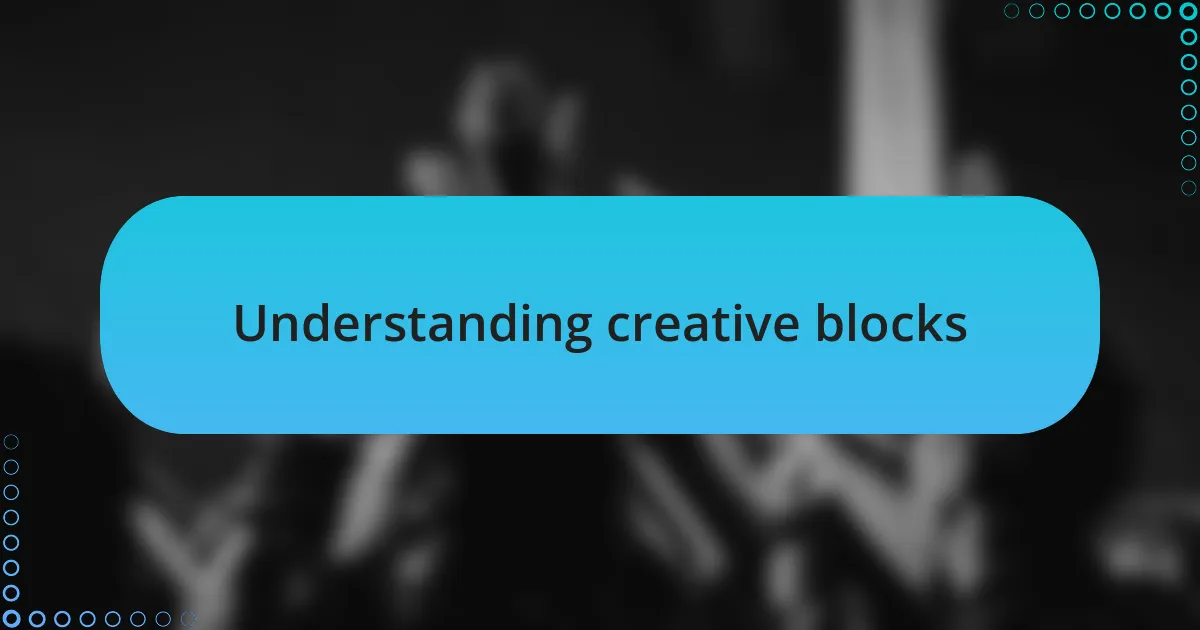
Understanding creative blocks
Creative blocks can feel like a thick fog, settling in unexpectedly and obscuring our path forward. One time, I sat in a practice room, guitar in hand, waiting for inspiration to strike, but nothing came. I began to wonder—what really causes these mental roadblocks?
Often, these blocks stem from pressure—whether it’s the weight of expectations or the fear of not being good enough. I’ve experienced that paralyzing self-doubt, where I question if my music is valuable or relevant. It hits hard, doesn’t it? Recognizing this pressure can be the first step in confronting our creative struggles.
Sometimes, a block is just a signal that we need to take a break. I recall a week where I put my instruments down entirely, allowing my mind to wander and find joy in simple things again. That time away rekindled my passion, transforming frustration into a renewed creative energy when I finally picked up my guitar.
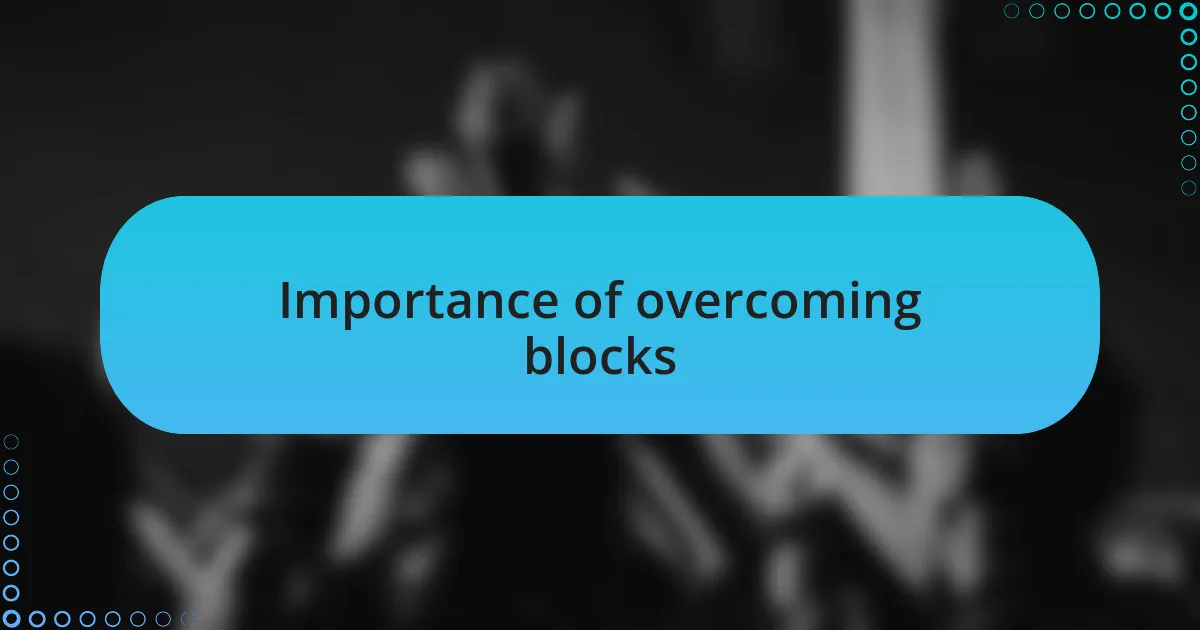
Importance of overcoming blocks
Overcoming creative blocks is vital for musicians because it directly influences our artistic growth. I once faced a long stretch where every note felt forced, and I struggled to write a single song. Recognizing that pushing through wasn’t a solution, I learned how important it is to embrace these moments as opportunities for self-discovery rather than obstacles.
When we tackle these blocks, we often emerge with a deeper understanding of ourselves and our craft. I remember a particular period when I decided to explore different genres, breaking free from my usual style. That shift not only helped me conquer my artistic drought but also enriched my music in ways I had never anticipated. Have you ever found that stepping outside your comfort zone leads to the most profound breakthroughs?
Ultimately, overcoming blocks fosters resilience and innovation. Each time I encounter a creative roadblock, it reminds me that the struggle is part of the journey. By learning to navigate these moments, I grow stronger and more adaptable, leading to richer and more authentic music creation in the long run.
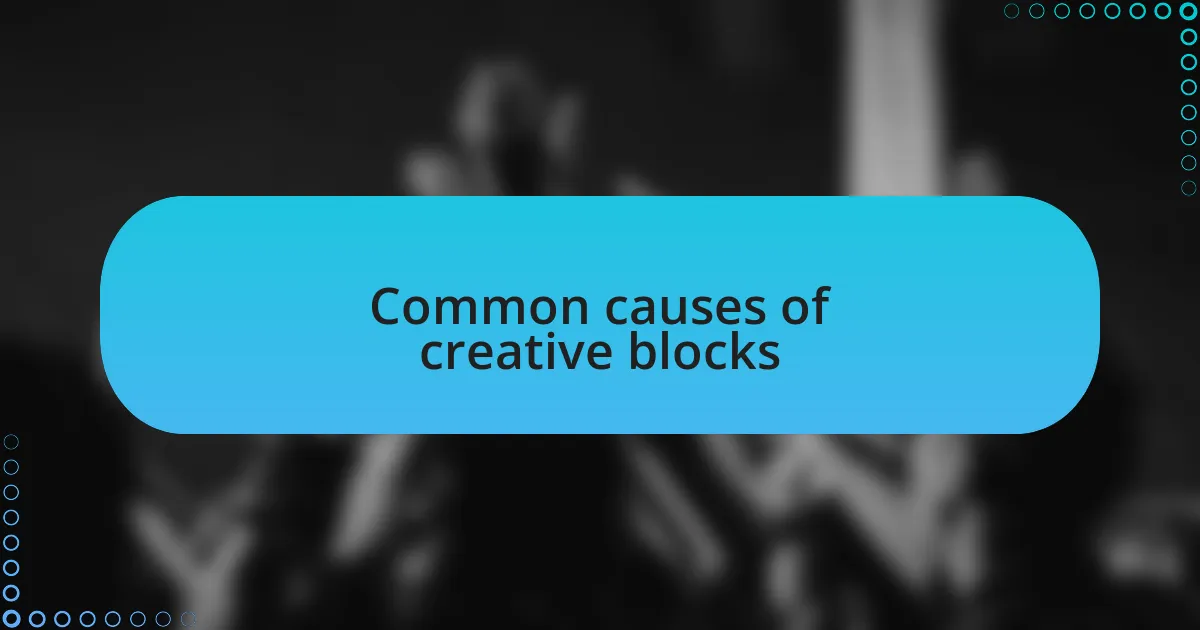
Common causes of creative blocks
One common cause of creative blocks is the pressure to meet expectations—both our own and those of others. I remember a time when I was working on an album and felt an overwhelming need to produce hits. This burden stifled my creativity, leaving me staring at my instrument, feeling more like a machine than an artist. Have you ever experienced that suffocating pressure that makes it hard to even pick up your guitar?
Another factor is the fear of failure, which can be paralyzing. I once sat down to write a song, but the thought of creating something that didn’t live up to my previous work held me back. It’s like standing on the edge of a cliff, afraid to jump because you doubt you’ll land safely. How many of us have missed out on creating something beautiful because we were too afraid it wouldn’t be perfect?
Lastly, burnout is a significant culprit behind creative stagnation. After an intense season of writing and performing, I found myself utterly depleted. With no energy left to create, I realized I needed to step away and recharge. Have you felt that exhaustion creeping in after a relentless push to produce? Taking breaks is essential, as it allows space for inspiration to return, though it might feel counterintuitive at the moment.
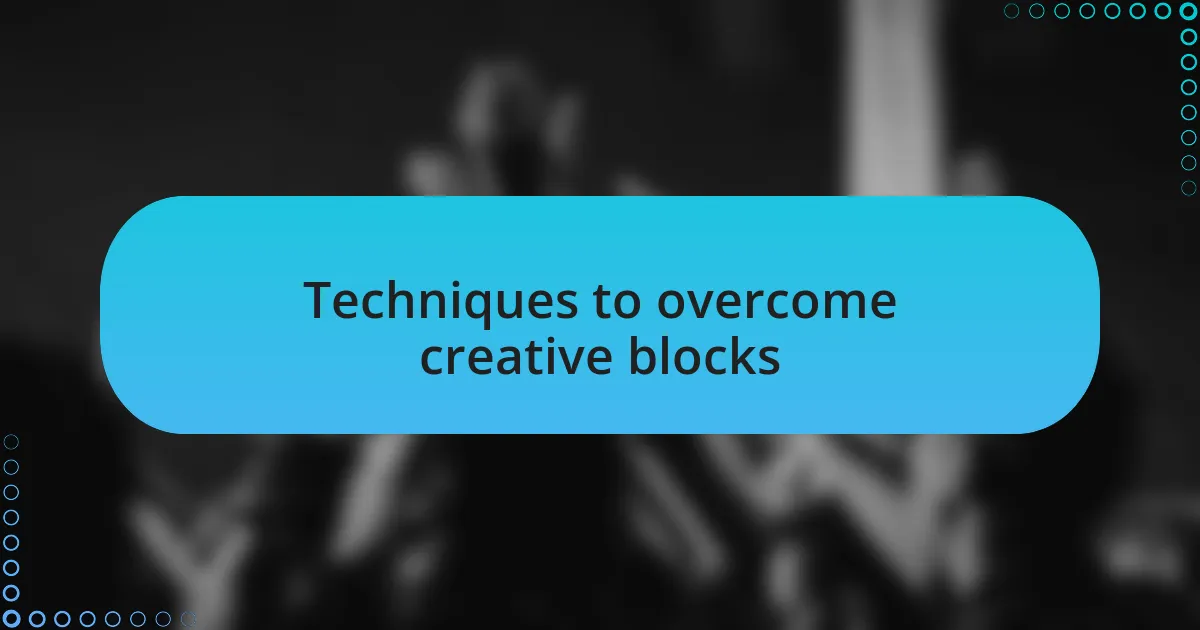
Techniques to overcome creative blocks
One technique that has worked for me in overcoming creative blocks is embracing spontaneity. I often set aside a few minutes to play whatever comes to mind, without any expectations. This free play reminds me of the joy of creating—it’s like exploring a new path in a familiar forest, allowing unexpected melodies and rhythms to emerge. Have you ever tried just letting your fingers wander? Sometimes, that’s where the magic happens.
Another method I find helpful is stepping away from the norm. When I encounter a creative wall, I switch genres or try a different instrument—experimenting with sounds I typically wouldn’t consider. I vividly recall a time when I picked up a keyboard instead of my guitar, and the fresh perspective shifted my entire creative process. It’s fascinating how breaking routines can unlock new channels of inspiration, don’t you think?
Lastly, talking things out with fellow musicians often reignites my creativity. I remember a candid conversation with a bandmate who shared his struggles, which led us to brainstorm ideas together. This collaborative energy can be like a breath of fresh air, reminding us that we’re not alone in our creative journeys. Have you ever found that discussing your blocks with someone else brought a surge of new ideas?
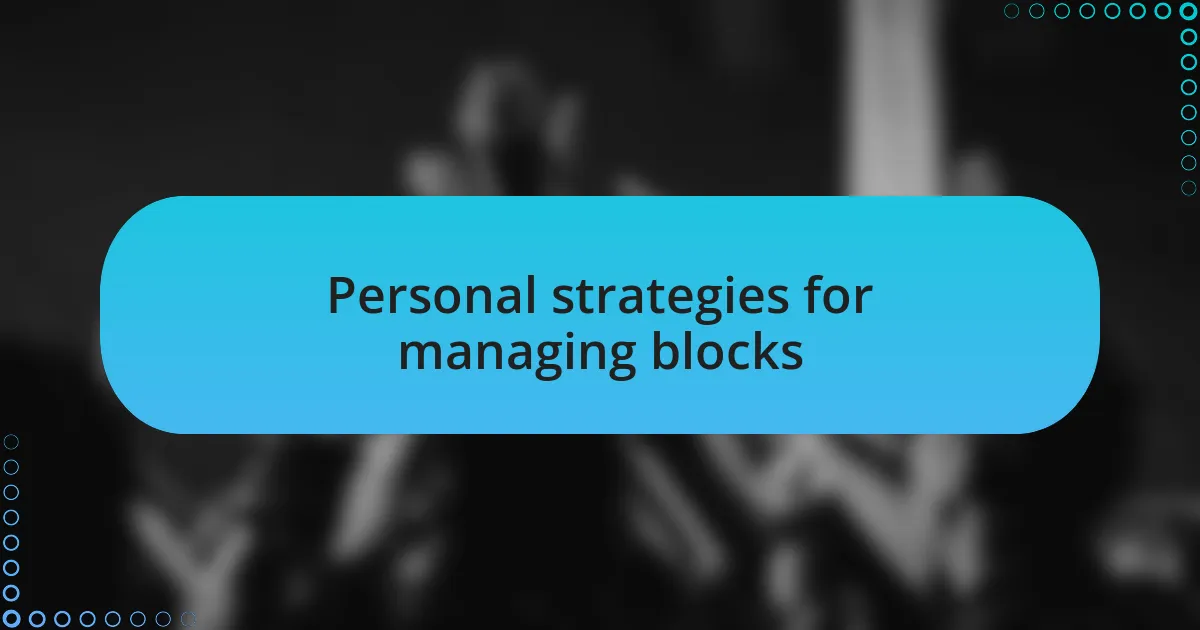
Personal strategies for managing blocks
One strategy I often rely on is creating a dedicated space for creativity. For me, having a specific area—whether it’s a particular room or a cozy corner—helps signal to my brain that it’s time to create. I remember transforming a small nook in my apartment into my “music zone,” complete with inspiring artwork and personal mementos. Do you have a place that sparks your creativity?
Another approach I use involves setting small, achievable goals. Sometimes, the pressure of a big project can be overwhelming, leading to blocks. I’ve found that breaking my work into bite-sized tasks helps alleviate anxiety and makes it feel more manageable. For instance, instead of aiming to complete an entire song, I’ll focus on writing just one verse. This way, each completed task feels like a victory and motivates me to keep pushing forward.
Additionally, I’ve discovered the power of routine shifts. When I feel stuck, I’ll change my daily schedule—whether it means writing in the morning instead of at night or taking a walk before a practice session. A few weeks ago, I decided to start my day with a quick jam session before tackling other tasks. That slight shift invigorated my creativity and allowed new ideas to flow freely. Have you tried changing your routine to stimulate creativity?
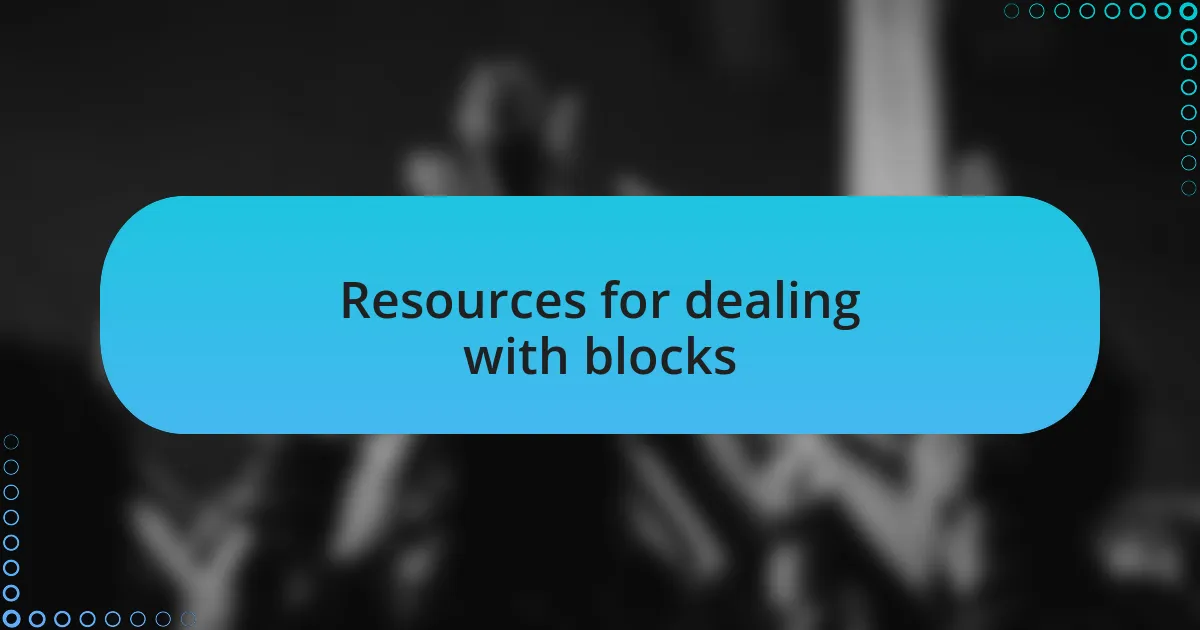
Resources for dealing with blocks
There’s a wealth of resources available that can help combat creative blocks. One of my top recommendations is the use of creativity apps, like Brain.fm or Evernote. I recall using Brain.fm during a particularly dry spell—I found that the focused music really helped my mind lock in and quiet the noise of distractions. Have you ever tried using music to guide your creative flow?
Engaging with fellow musicians can also be a fantastic way to break free from a rut. I once attended a local jam session, and the energy in the room was electric. Sharing ideas and collaborating with others reignited my passion for music, reminding me that sometimes, all it takes is a conversation or a shared experience to spark inspiration. Have you ever felt that shift when surrounded by like-minded individuals?
Books and online courses are another resource worth exploring. I’ve dabbled in courses about songwriting techniques, and they’ve opened my eyes to new perspectives and approaches that I never considered before. It’s fascinating how the insights of others can transform your thinking. What resources have you found helpful in your journey?
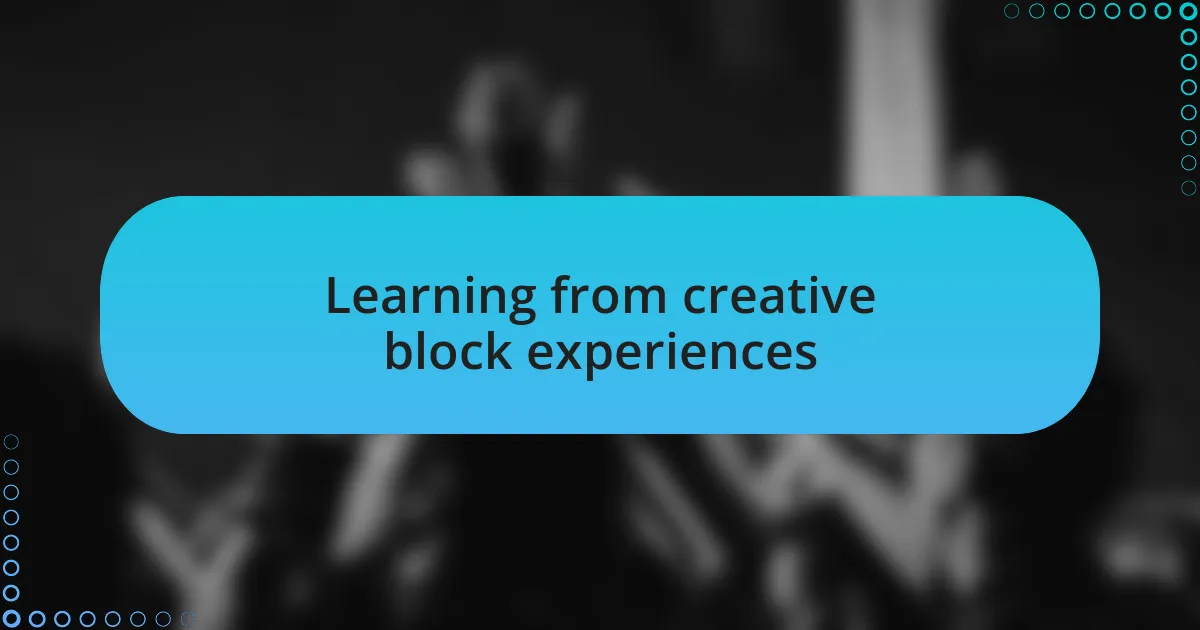
Learning from creative block experiences
Creative blocks can feel incredibly isolating, but each experience offers valuable lessons. I remember a time when I couldn’t write a single lyric for weeks. After grappling with that frustration, I realized that my struggle pointed to a deeper need for self-reflection. Much like a storm before the calm, those moments taught me to embrace the quiet and seek clarity from within. Have you ever had a similar revelation during a challenging time?
In another instance, I hit a wall while trying to arrange a song. I decided to step away from my music completely and engage in an entirely different creative outlet—painting. Surprisingly, this change of focus allowed my mind to wander freely, and ideas began to surface unexpectedly when I returned to my music. It was a reminder that sometimes detours can lead back to the right path. Have you explored other creative avenues during a block?
Looking back, I’ve come to appreciate that creative blocks aren’t just obstacles; they are opportunities for growth. Each time I face a block, I approach it with curiosity instead of dread. I’ve learned to ask myself what these moments are trying to teach me and how they can lead to new discoveries in my music. Isn’t it fascinating how a challenge can ultimately deepen our understanding of our craft?